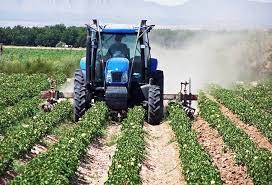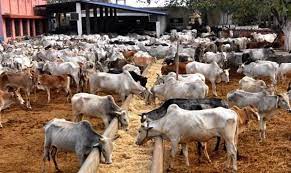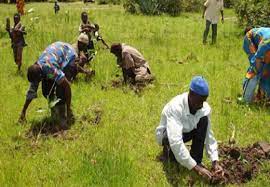The Food and Agriculture Organization of the United Nations (FAO) as part of its 2018 rainy season programme in the North East offered 630 farmers free seeds for the planting season The organisation at its first ever seed fair that held in Tikau, a large ward in the Nangere local government area of Yobe State had 400 cereal farmers, 130 groundnut farmers and 100 vegetable farmers – had the freedom to select improved drought-tolerant and disease-resistant varieties of their preferred seed during the oneday event.
An array of local out-growers supported by FAO as well as medium-scale seed companies were also present at the fair.
According to a statement by the communication office, Mr David Karls Tsokar, said farmers were selected on the basis of their need for inputs, access to land and ability to farm during the rainy season.
“FAO provided them with vouchers to redeem seed for staple crops like millet, sorghum and cowpea as well as high-value cash crops like groundnut.
Farmers could choose between millet and sorghum which they could combine with other seed.
“In Nigeria, as much of the vegetable production lies in the domain of women, FAO developed special vegetable kits accessible only to female farmers that included okra and amaranth seed.
Farmers also received a 25- kg bag of fertilizer to improve productivity in the ensuing months.
The vouchers were made possible thanks to funding by the DirectorateGeneral for European Civil Protection and Humanitarian Aid Operations, the Government of Norway and the United States Agency of International Development,” he said.
Zainab Abu, a groundnut, cowpea and vegetable farmer, was first in line to select seed at the fair.
“The seed I chose is very high quality, I hope that I can get a good yield from this”, she said.
Zainab shared that it was the first time she had ever received a voucher for seed – or any input for that matter and was looking forward to planting as soon as the rains, which began in late May, were established.
The vouchers will significantly reduce the financial strain of the cost of improved seeds for many food insecure farming households.
The 10 kg bags of staple seeds provided typically command a market price of NGN 6 000.00-9 000.00 (USD 17.00- 25.00) each, while many households in Nangere live on less than USD 2.00 a day.
Prior to the start of the event, FAO received the ‘blessing’ of the lamba or chief of Tikau Ward, El Hajj El Hassan Adamu Tikau.
The community leader and his committee of elders were central to planning the seed fair and the verification of beneficiaries, many of whom lack formal identification.
At the start of the event, El Hajj spoke on the importance of reducing poverty in Tikau and the wider community amid the agricultural impact of the northeastern Nigerian crisis.
“A lot of our relatives are coming back to their old villages”, he said, referencing the high levels of displacement caused by the Boko Haram insurgency.
“This fair comes at a very important time in our history and will help us to produce more to help our brothers and sisters who have returned”, said the lamba.
To support households recovering from the impact of the Boko Haram insurgency in 2018, FAO is appealing for USD 31.5 million, of which USD 10.4 million was mobilized so far.
According to the latest Cadre Harmonisé, 2.9 million people in northeastern Nigeria are expected to be food insecure in the three states of Adamawa, Borno and Yobe during the 2018 lean season (June-August 2018).
In preparation for the seed fair, FAO met with local seed growers in Nangere to ensure that the seed they produced was of high quality.
The Organization undertook numerous quality checks at various phases of production to ensure compliance with both FAO’s standards as well as those of Nigeria’s National Seed Council.
For Harouna Adu Langawana, an out-grower based in Nangere, the event was the perfect opportunity to both market his super sosat millet seed to producers and help his community.
“Our farmers need our support to access high-yielding seed which will help them to better feed their families and fight poverty in Nangere”, he said.
Harouna sourced his foundation seed from the International Crops Research Institute for the Semi-Arid Tropics, one of FAO’s partners for the fair.
FAO also worked closely with the Civil Society Coalition for Poverty Eradication and the Yobe Agricultural Development Programme, an extension arm of Yobe State’s Ministry of Agriculture and Natural Resources.
Blueprint gives you the latest Nigerian news in one place. Read the news behind the news on burning National issues, Kannywood, Videos and the Military



